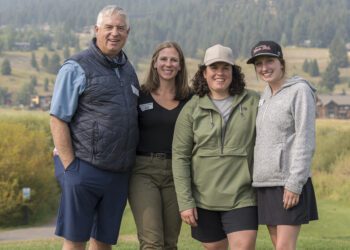By Michael Somerby EBS STAFF
BIG SKY – The Big Sky Resort Area District tax board has some major fish to fry in the coming months, chiefly educating the public about a potential 1 percent increase in the resort tax and ensuring area businesses comply with resort tax collections—such were the topics of discussion at their March 11 open board meaning.
The resort tax, which has funded numerous capital improvements and organizational efforts in the growing mountain town since its 1992 genesis, could potentially see a temporary uptick effective July 1—a 1 percent increase in the resort tax, which would be used expressly for critical upgrades to Big Sky’s strained wastewater treatment facilities.
A May 5 community vote will decide the fate of such a change, and while payees classically oppose taxation increases—a phenomenon not unique to Big Sky— BSRAD District Manager Daniel Bierschwale says the very nature of Big Sky’s resort tax bares good reason to attempt to palette it.
“What we want people to understand is that, unlike a county or federal tax, 100 percent of the resort tax collections are used entirely in Big Sky for community identified needs,” Bierschwale told EBS in a March 10 interview.
A 1 percent increase to the existing 3 percent may generate some frustration, but the alternative would be Big Sky County Water and Sewer District increasing rates by as much as two-times the current rates to help offset the cost of the upgrades should the 1 percent fail to pass the vote in May. A failure to pass would also have an impact on appropriation shares from the existing 3 percent collections.
A number of educational opportunities have been scheduled, including three “plant update open houses”—held at the BSCWSD office March 24, April 1 and 16, respectively—along with four “education booths” on April 2, 9, 23 and 30, operated at the Big Sky Post Office (see pg. 53 for a full roster of dates and locations).
The board unanimously approved a first reading of a new compliance ordinance, which will hold accountable the roughly 1,000 businesses registered to collect tax on qualifying luxuries, goods and services within the district. The measure aims to give these businesses the opportunity to provide accurate reporting and full transfer of funds to BSRAD, which ultimately redistributes those collections through appropriations each summer.
“It creates equity in our community for our business owners,” said board member Ciara Wolfe.
Bierschwale echoed the sentiment: “Fairness within the community is what we’re striving for.”
As of EBS press time, the top of the ordinance document read that the measure is “an ordinance describing the procedures for enforcement and collection of the Big Sky resort tax.”
Other agenda items at the March 11 meeting included discussion of a draft strategic plan, a blueprint of sorts for BSRAD’s operations.
District board members commended Bierschwale and his staff for the detail included in the three-year plan, but caveats of regular revisions and review followed.
“I like that it’s a very actionable plan,” said BSRAD Chairperson Kevin Germain, “but strategic plans have a tendency to be stuck on shelves so I look to you, Danny, to ensure we look at this plan and update it every six months.”
The board also addressed its “Draft Budget FY21,” with hopes of formal adoption at the April 8 meeting. Members of the board acknowledged that historic rates of growth in collections as a result of increases in residency and tourism over the last decade might slow with current economic trends.
Living in Big Sky can at times feel insular, but nothing underscored the community’s tether to the outside world better than a comment from BSRAD Secretary Buz Davis regarding COVID-19, officially classified as a global pandemic by the World Health Organization on March 11.
“If [COVID-19] continues to grow at the rate it’s growing,” Davis said, “we may need to rethink how to keep our community safe.”











